沪教版上海牛津英语五年级上期末知识点总结(完美版)
- 格式:pdf
- 大小:76.40 KB
- 文档页数:5

M1U1 Can I do this?1. 用‘there’作为开头表示事实,例如:There’s the red man。
2。
用祈使句发指令。
例如:Cross! Go! Wait!3. 用祈使句的否定形式禁止他人做某事。
例如:Don’t Cross the road。
Don't smoke。
Don’t make a noise.4。
用名词表达事物。
例如:The traffic light’s red.5。
用情态动词can征求允许。
例如:Can I go out , Mum?6. 用Here you are回答问题。
(给你)7. 用现在进行时表达正在进行的事情。
例如:They are going out。
8。
用一般现在时态表达简单的事实。
例如:They are on the train。
9. 学习用which对定语提问。
例如:Which sign means ‘Don’t eat or drink’?(哪一个标志的意思是“禁止吃喝”)10. 用I’m sorry. 表达歉意。
11. 在否定句中用or代替and。
例如:Don’t eat or drink.M1U2 This is what I want1. 用What do you want ? 询问“你想要什么?”2. 用I want…表达要求。
例如:I want some paper.3. 学习用Here’s /Here are …表达“给你… …”。
4。
用Thank you very much.表达感谢。
5。
用形容词修饰东西。
例如:a large Coke (一大罐可乐)6。
用情态动词can征求许可。
例如:Can I have some fish,please?7。
学习关于菜的名称。
例如:noodles、vegetablesM1U3 This is what I need1。
关于学习用品的单词。
例如:books.2。
用’What do you need for school ?' 询问“你上学需要什么?"3。

沪教牛津英语五年级上册知识点归纳作为开头表示事实;例如:There’s the red man.1. 用‘there’2. 用祈使句发指令.例如:Cross! Go! Wait!3. 用祈使句的否定形式禁止他人做某事.例如:Don’t Cross the road. Don’t smoke. Don’t make a noise.4. 用名词表达事物.例如:The traffic light’s red.5. 用情态动词can征求允许.例如:Can I go out , Mum?6. 用Here you are回答问题.(给你)7. 用现在进行时表达正在进行的事情.例如:They are going out.8. 用一般现在时态表达简单的事实.例如:They are on the train.9. 学习用which对定语提问.例如:Which sign means ‘Don’t eat or drink’?(哪一个标志的意思是“禁止吃喝”)10. 用I’m sorry. 表达歉意.11. 在否定句中用or代替and.例如:Don’t eat or drink.M1U2 This is what I want1. 用What do you want ? 询问“你想要什么?”2. 用I want…表达要求.例如:I want some paper.表达“给你……”.3. 学习用Here’s /Here are …4. 用Thank you very much.表达感谢.5. 用形容词修饰东西.例如:a large Coke (一大罐可乐)6. 用情态动词can征求许可.例如:Can I have some fish, please?7. 学习关于菜的名称.例如:noodles、vegetablesM1U3 This is what I need1. 关于学习用品的单词.例如:books.询问“你上学需要什么?”2. 用’What do you need for school ?’ 3. 用We need … 表达“我们需要……”.例如:We need some paints.4. 用一般现在时表达想法.例如:That smells good. (闻起来真不错)5. 用情态动词提出要求.例如:Can I have a bowl, please?6. 用We have got … 表达“我们有…”.例如:We’ve got some water.7. 用but表示转折.例如:Kitty has a uniform but it is small.8. 用现在进行时表达正在发生的事情.例如:They are looking at some uniforms.9. 用形容词进行修饰.例如:It is cheap but it is nice.M2U1 Me1. 用一般现在时表达习惯的行为.例如:This is the way I wash my face.(这就是我洗脸的方式)2. 在时间前用at表达.例如:at half past one in the afternoon (早中晚前用in the ;周几前用on.)3. 用what time询问事情发生的时间.例如:What time do you get up ?4. 用一般时态表达自己或者他人的作息安排.例如:I get up at six. Ben gets up at seven.(注意第三人称单数在一般时态中的变化.)M2U2 What do you like?1. 用Are you …? 询问“你…….?”及其回答Yes, I am.或No, I am not.2. 用祈使句发指令.例如:Clap your hands.(拍手)3. 用or连接的选择疑问句.例如:Is Kitty hungry or full?及其回答She is hungry.或She is full.ay on Saturday.(Kitty, 星期六是你生日)4. Kitty, it’s your birthd例如:Which bag does Kitty want? (Kitty想要哪个书包?)5. 用Which询问“哪个”.表达喜好.例如:I don’t like the black one but I like the green one.6. 用I like 或I don’t like …t.询问“Kitty喜欢…吗?”及其回答Yes, she does.或No, she doesn’7. 用Does Kitty like …?8. 用but表示转折.例如:I don’t like the green one but I like the yellow one.9. 指定某一特殊物体.例如:I want the pink one, please. (我想要粉红色的那个)10. 关于食物的名称.例如:cabbage, carrots, sausages11. 用What do you like?询问“你喜欢什么?”及其回答I like…“我喜欢……”;例如:I like rice.M2U3 A birthday party1. 日期的表达.例如:the fourth of February (二月4号)2. 用When’s your birthday?询问“你的生日是哪天?”3. 在日期前用介词on.例如:My birthday’s on the fourth of February.4. 用序数词表达:twenty-first (第二十一)5. 用Which … do you like? 询问“你喜欢哪个……?”及其回答I like that one.6. 用What are you doing? 询问“你正在干什么?”7. 用现在进行时表达正在发生的事情.例如:I’m making some cards. (我在制作卡片)8. 用Do you want … or …? 表示选择,意思为“你想要…还是…?”M3U1 My school例如:There are two floors.表达“有…”.1. 用There is /are…2. 用hundre d“百”的表达.例如:There are a hundred children in my school.3. 用how many 询问数量.例如:How many floors are there in your school?4. 用时间的表达(具体时间前面用at ).例如:At a quarter to/past twelve we have our lunch.5. 用一般现在时表示习惯的行为.例如:I eat my lunch at 7 o’clock in the morning..例如:I like Monday.表达“我喜欢…”.6. 用I like …7. 用现在进行时表达正在发生的事情.例如:I am painting a picture.8. 用一般现在时表达事实.例如:Eight children in our class go to school.9. 用How do you go to …?询问乘坐什么交通工具?回答:I go by tram.(其中步行用on foot = walk)M3U2 Let’s go shopping1. 用I want 表达“我想要……”.例如:I want a new ball.2. 用指示代词和冠词进行修饰.例如:I want a new umbrella. That one’s big.3. 用how much询问多少钱.例如:How much money have you got ?4. 表达钱币.例如:A¥50 note is green.例如:I’ve got eighty yuan.5. 用I have got 表达“我有……”.6. 用Which one?表达“哪一个?”7. 用形容词修饰物品.例如:The big blue one.8. 用Excuse me.表达“打扰一下”.9. 用What’s she buying?询问“她正在买什么?”及其回答She’s buying some bread.M3U3 Follow the signs!例如:Don’t jump into the pool.1. 用祈使句的否定形式表达“禁止……”.2. 用It’s dangerous. 表达危险.3. 用’Which one means … ?’表达“哪个表示……?”4. Eddie and Danny like football.例如:She has a dog..5. 用She has …表达“她有……”.6. 用现在进行时表达正在发生的事情.例如:A boy is riding his bicycle here.例如:You can’t ride a bicycle here.7. 用can’t 表达“禁止……”.8. 用祈使句发指令.例如:Look at this sign!9. 用Why not?询问理由.(为什么不?)10. 用适当的介词表示地点.例如:They are going to North Park by bus.M4U1 Wild animals1. 用一般现在时态表达事实.例如:Some monkeys live in the jungle.例如:It can swing on the rope.表达“不能、不会”.2. 用can表达“能;会”或can’t3. 用现在进行时表达正在发生的事情.例如:This one is eating a banana.4. 用Does it eat…?询问“它吃……吗?”及其回答Yes, it does.或No, it doesn’t.5. 用like 表达喜好.例如:I like monkeys.6. 用Can a giraffe…? 询问“长颈鹿能……吗?”及其回答Yes, it can. 或No, it can’t.7. 用Where 询问地点.例如:Where does it live?M4U2 Butterflies1. 用What’s that? How do you spell that in English?询问“那是什么?你用英语怎么拼?”2. 用形容词修饰.例如:It’s beautiful.3. 用I don’t know .表达“我不知道”.4. 用一般现在时表达事实.例如:It lays some eggs on a leaf.5. 用like 表达喜好.例如:I like butterflies.6. 用Which one do you like ?询问“你喜欢哪一个?”7. 用and连接并列关系.例如:I like the red and yellow one.8. 用but进行转折.例如:I like the…one but I don’t like the … one.M4U3 Parks and places in China1. 用一般现在时表达事实.例如:I don’t know this place.in Shanghai. It’s on Hainan Island.2. 用介词表达在某个地方.例如:It’s3. 表达地名和地方.例如:That’s the Li River.4. 用情态动词进行请求.例如:Can we see the dolphins?5. 用形容词进行修饰.例如:I’m hungry.6. 用一般将来时表达将要发生的事情.例如:Janet and Simon are going to Ocean Park.7. 用where询问地方.例如:Where are Janet and Simon going?例如:Who is the man?8. 用who 询问“谁”.例如:What is he doing?9. 用what询问“干什么”.。

一. Words1. east 东2. south 南3. west 西4. north 北5. move 移动6. bedroom 卧室7. kitchen 厨房8. study 书房,学习9. face 朝着10. bathroom 浴室二. Phrases1. living room 客厅2. dining room 餐厅3. the Chens 姓陈的一家人4. be happy to do 做某事很开心5. be happy with …对…感到满意6. face south 朝南7. a lot of sunshine 许多阳光8. all day 整天三. Sentences1. Which room do you like ?你喜欢哪个房间?2. Why do you like it?你为什么喜欢它?3. I know why. 我知道为什么。
4. Because the living room faces south. 因为客厅朝南。
5. Do you like Mary’s home or Jhon’s home?你喜欢玛丽的家还是简的家?一. Words1. 东________________2. 南________________3. 西________________4. 北________________5. 移动________________6. 卧室________________7. 厨房________________ 8. 书房,学习________________9. 朝着________________ 10. 浴室________________二. Phrases1. 客厅_________________________________2. 餐厅_________________________________3. 姓陈的一家人_________________________________4. 做某事很开心_________________________________5. 对…感到满意_________________________________6. 朝南_________________________________7. 许多阳光_________________________________8. 整天_________________________________三. Sentences1. 你喜欢哪个房间?________________________________________________2. 你为什么喜欢它?________________________________________________3. 我知道为什么。
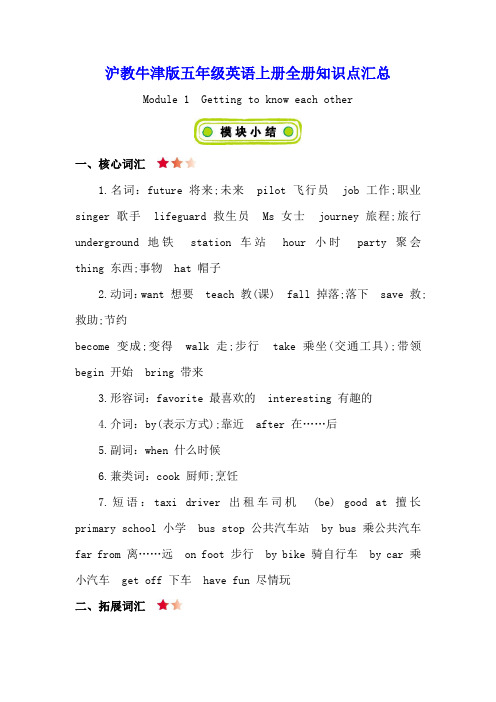
沪教牛津版五年级英语上册全册知识点汇总Module 1 Getting to know each other一、核心词汇1.名词:future 将来;未来pilot 飞行员job 工作;职业singer 歌手lifeguard 救生员Ms 女士journey 旅程;旅行underground 地铁station 车站hour 小时party 聚会thing 东西;事物hat 帽子2.动词:want 想要teach 教(课) fall 掉落;落下save 救;救助;节约become 变成;变得walk 走;步行take 乘坐(交通工具);带领begin 开始bring 带来3.形容词:favorite 最喜欢的interesting 有趣的4.介词:by(表示方式);靠近after 在……后5.副词:when 什么时候6.兼类词:cook 厨师;烹饪7.短语:taxi driver 出租车司机(be) good at 擅长primary school 小学bus stop 公共汽车站by bus 乘公共汽车far from 离……远on foot 步行by bike 骑自行车by car 乘小汽车get off 下车have fun 尽情玩二、拓展词汇1.名词:doctor 医生teacher 老师sky 天空subject 科目2.月份名词:January (Jan.) 一月February(Feb.) 二月March(Mar.) 三月April(Apr.) 四月May 五月June(Jun.) 六月July(Jul.) 七月August(Aug.) 八月September(Sept.) 九月October(Oct.) 十月November(Nov.) 十一月December(Dec.) 十二月3.动词:help 帮助4.短语:fly a plane 驾驶飞机be afraid of 害怕三、核心句型1.—What do you want to be? 你想要成为什么?—I want to be a pilot. 我想要成为一名飞行员。

M4U2第一课时背诵内容一. Words1. gently adv. 温柔地,轻柔地2. strongly adv. 猛烈地3. slowly adv. 缓慢地4. quickly adv. 快速地5. softly adv. 柔和地6. blow v. 吹7. windmill n. 风车8. move v. 移动二. Phrases1. blow gently 轻轻地吹2. dance in the wind softly 在风里轻柔地舞动着3. move slowly/quickly 缓慢地/快速地转动4. fly their kites happily 开心地放风筝5. go out 出去6. look out of …向外看去7. rain heavily 雨下得很大8. watch the weather on TV 在电视上观看天气预报9. a heavy rain 一场大雨10. a strong wind 一阵大风11. a rainy day 一个下雨天三. Sentences1. There is no wind. = There isn’t any wind. 那里没有一点风。
2. The children swim happily in the sea. 孩子们在海里开心地游泳。
3. The wind is blowing gently/strongly. 风轻轻地/猛烈地刮着。
4. The windmill is moving slowly/quickly. 风车慢慢地/快速地转着。
5. The children are flying kites happily in the park.孩子们在公园里开心地放风筝。
M4U2第一课时背诵内容一. Words1. 温柔地,轻柔地___________________2. 猛烈地___________________3. 缓慢地___________________4. 快速地___________________5. 柔和地___________________6. 吹___________________7. 风车 ___________________ 8. 移动___________________二. Phrases1. 轻轻地吹____________________________________2. 在风里轻柔地舞动着____________________________________3. 缓慢地/快速地转动____________________________________4. 开心地放风筝____________________________________5. 出去____________________________________6. 向外看去____________________________________7. 雨下得很大____________________________________8. 在电视上观看天气预报____________________________________9. 一场大雨____________________________________10. 一阵大风____________________________________11. 一个下雨天____________________________________三. Sentences1. 那里没有一点风。

沪教版(上海)牛津英语5A五年级上册知识点汇总Module1Unit1一,核心词汇1.first第一 2.second第二第二 3.third第三 4.fourth 第四第四 5.fifith第五6.sixth第六7.party派对,聚会 8.begain开始 9.bring 带来10.wear穿着11.favourite最喜欢的二,词组1. at Peter’s birthday party在Peter的生日聚会上 2. on the 19th of September在9月19日on Sunday在周日 4在晚上.at two o’clock在两点 5. in the afternoon在下午 6. at night7. sb. be tired某人很累某人很累 8. my favourite color我最喜欢的颜色 9. That sounds interesting.那听上去有趣10. I can’t wait! 我等不及了!欢迎来我的派我等不及了! 11. Happy Birthday! 生日快乐 12. Welcome to my party. 一条橙色的裤子 14. make a birthday invitation制作一张生日请帖对 13. a pair of orange trousers15. make a hat制作一顶帽子 16. have some fun过得高兴 17. birthday present生日礼物三,词汇解释1.bring,take,carry辨析bring是指把人或物从别处带到说话人所在的地方。
例如:Bring me some water, please.请给我取点水来。
carry及物动词,“搬运,运送”,一般是指搬运较重的物品。
例如:carry a box on one’s shoulder扛着箱子 carry a baby on one’s back背着孩子“携带,带”例如:Almost every teacher carries a watch.我身边不带差不多每位教师都带着一只表。
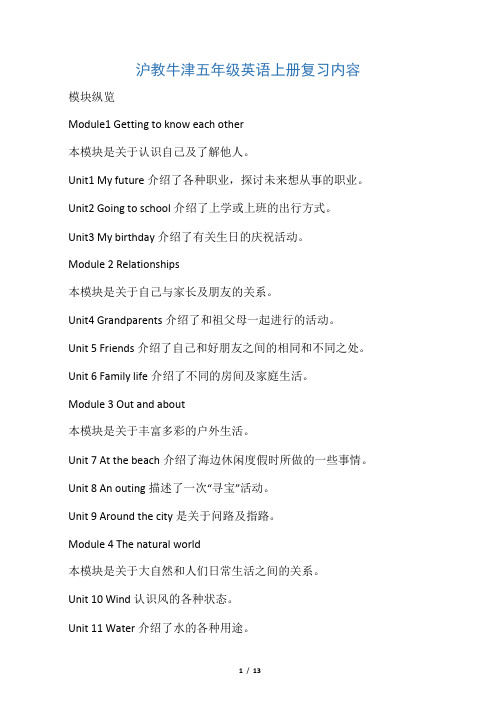
沪教牛津五年级英语上册复习内容模块纵览Module1 Getting to know each other本模块是关于认识自己及了解他人。
Unit1 My future介绍了各种职业,探讨未来想从事的职业。
Unit2 Going to school介绍了上学或上班的出行方式。
Unit3 My birthday介绍了有关生日的庆祝活动。
Module 2 Relationships本模块是关于自己与家长及朋友的关系。
Unit4 Grandparents介绍了和祖父母一起进行的活动。
Unit 5 Friends介绍了自己和好朋友之间的相同和不同之处。
Unit 6 Family life介绍了不同的房间及家庭生活。
Module 3 Out and about本模块是关于丰富多彩的户外生活。
Unit 7 At the beach介绍了海边休闲度假时所做的一些事情。
Unit 8 An outing描述了一次“寻宝”活动。
Unit 9 Around the city是关于问路及指路。
Module 4 The natural world本模块是关于大自然和人们日常生活之间的关系。
Unit 10 Wind认识风的各种状态。
Unit 11 Water介绍了水的各种用途。
Unit 12 Fire介绍了一些基本的防火知识。
第一单元复习1.词组Jump into the lakefly a planecook nice food(be) afraid of flyinghelp peopledrive a taxi(be)good at...2.句型用What do you want to be ?询问对方将来想从事的职业。
用I want to be ...及I want to(do)...介绍自己未来想从事的职业及理由。
3.难点1)当句子主语为第三人称单数时,动词要做适当的变化。
2)want to do与want to be的正确用法。

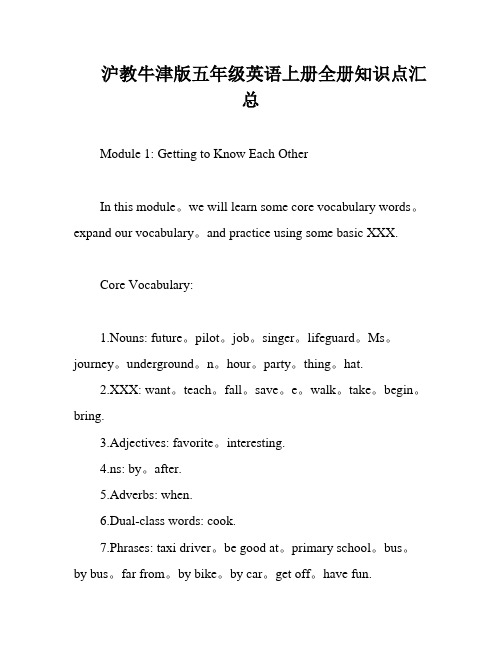
沪教牛津版五年级英语上册全册知识点汇总Module 1: Getting to Know Each OtherIn this module。
we will learn some core vocabulary words。
expand our vocabulary。
and practice using some basic XXX.Core Vocabulary:1.Nouns: future。
pilot。
job。
singer。
lifeguard。
Ms。
journey。
underground。
n。
hour。
party。
thing。
hat.2.XXX: want。
teach。
fall。
save。
e。
walk。
take。
begin。
bring.3.Adjectives: favorite。
interesting.4.ns: by。
after.5.Adverbs: when.6.Dual-class words: cook.7.Phrases: taxi driver。
be good at。
primary school。
bus。
by bus。
far from。
by bike。
by car。
get off。
have fun.XXX Vocabulary:1.Nouns: doctor。
XXX。
sky。
subject.2.Months: January。
February。
March。
April。
May。
June。
July。
August。
September。
October。
XXX。
XXX.3.XXX: help.4.Phrases: fly a plane。
be afraid of.XXX Structures:1."What do you want to be?" - "I want to be a pilot." (Asking XXX.)2."What do you want to be?" - "I want to be a XXX." (Asking XXX.)In this module。

M4U3第一课时背诵内容一. Words1. safety n. 安全2. must(model verb.)必须,一定3. mustn’t(model verb.)一定不4. forest n. 森林5. careful adj. 仔细的6. poster n. 海报7. match n. 火柴8. smoke v./n. 吸烟/烟9. campfire n. 篝火10. burn v. 燃烧11. luckily adv. 幸运地12. hurt v. 伤害13. thick adj. 厚的,浓的14. everywhere adv. 到处二. Phrases1. at Rainbow Primary School 在彩虹小学2. talk about sth. 谈论关于某事3. fire safety 防火安全4. start in forest 始于森林5. at home 在家6. a big fire 一场大火7. burn in the fire 在火里燃烧8. thick smoke 在电视上观看天气预报9. drop water on the fire 在火上降水10. fight the fire bravely 勇敢地与火战斗11. die down 逐渐消失三. Sentences1. People must be careful. 人们必须小心。
2. Don’t smoke. = We mustn’t smoke. 不要抽烟。
3. Don’t start campfires. = We mustn’t start campfires. 不要生篝火。
4. Don’t play near fires. = We mustn’t play near fires. 不要靠近火源玩耍。
5. Don’t play with matches. = We mustn’t play with matches. 不要玩火柴。

M1U3第一课时背诵内容一. Words1. work 工作——worker 工人2. farm 农场——farmer 农夫3. teach 教——teacher 老师4. sing 唱歌——singer 歌手5. dance 跳舞——dancer 舞蹈家,跳舞的人6. write 写字——writer 作者,写字的人7. paint 用水彩画——painter 画家8. draw 素描画——drawer 抽屉9. cook 厨师、烹饪——cooker 厨具10. travel 旅行——traveller 旅行家11. pilot 飞行员二. Phrases1. want to do = would like to do 想要做某事2. help sick people 帮助病人3. fly an aeroplane 开飞机4. cook nice food 烹饪美食5. grow vegetables 种蔬菜6. give lessons to students 给学生上课7. sell things to people 把东西卖给别人8. shop assistant 店员三. Sentences1. What do you want to do?你想做什么?2. What do you want to be?你想成为什么?M1U3第一课时背诵内容一. Words1. _______________ 工作——_______________ 工人2. _______________ 农场——_______________ 农夫3. _______________ 教——_______________ 老师4. _______________ 唱歌——_______________ 歌手5. _______________ 跳舞——_______________ 舞蹈家,跳舞的人6. _______________ 写字——_______________ 作者,写字的人7. _______________ 用水彩画——_______________ 画家8. _______________ 素描画——_______________ 抽屉9. _______________ 厨师、烹饪——_______________ 厨具10. _______________ 旅行——_______________ 旅行家11. _______________ 飞行员二. Phrases1. 想要做某事____________________________________2. 帮助病人____________________________________3. 开飞机____________________________________4. 烹饪美食____________________________________5. 种蔬菜____________________________________6. 给别人上课____________________________________7. 把东西卖给别人____________________________________8. 店员____________________________________三. Sentences1. 你想要做什么?______________________________________________________________2. 你想成为什么?______________________________________________________________一. Words1. star 明星2. lifeguard 救生员3. save 救4. brave 勇敢的5. suddenly 突然地二. Phrases1. different dream jobs 不同的梦想职业2. from Rainbow Primary School 来自彩虹小学3. in the future 在未来4. travel around the world 周游世界5. be afraid of doing sth./be afraid to do sth. 害怕做某事6. jump into the lake 跳进湖里三. Sentences1. What’s your job now and what’s your dream job?你现在的职业是什么以及你的梦想职业是什么?2. What do you want to be in the future?你未来想成为什么?3. Do you have a dream?你有梦想吗?4. He is afraid of flying. 他害怕飞。
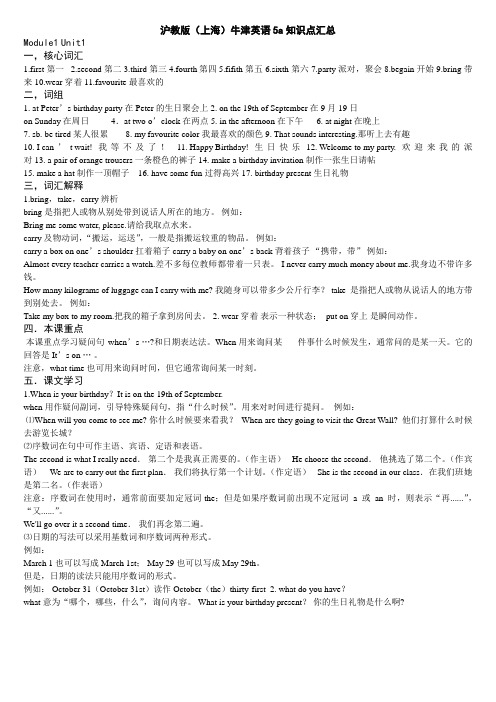
沪教版(上海)牛津英语5a知识点汇总Module1Unit1一,核心词汇1.first第一2.second第二3.third第三4.fourth 第四5.fifith第五6.sixth第六7.party派对,聚会8.begain开始9.bring带来10.wear穿着11.favourite最喜欢的二,词组1. at Peter’s birthday party在Peter的生日聚会上2. on the 19th of September在9月19日on Sunday在周日 4.at two o’clock在两点 5. in the afternoon在下午 6. at night在晚上7. sb. be tired某人很累 8. my favourite color我最喜欢的颜色 9. That sounds interesting.那听上去有趣10. I can’t wait! 我等不及了! 11. Happy Birthday! 生日快乐 12. Welcome to my party. 欢迎来我的派对 13. a pair of orange trousers一条橙色的裤子 14. make a birthday invitation制作一张生日请帖15. make a hat制作一顶帽子 16. have some fun过得高兴 17. birthday present生日礼物三,词汇解释1.bring,take,carry辨析bring是指把人或物从别处带到说话人所在的地方。
例如:Bring me some water, please.请给我取点水来。
carry及物动词,“搬运,运送”,一般是指搬运较重的物品。
例如:carry a box on one’s shoulder扛着箱子 carry a baby on one’s back背着孩子“携带,带”例如:Almost every teacher carries a watch.差不多每位教师都带着一只表。

沪教英语五年级上册知识点整理班级___________ 姓名____________学号____________ I.同音字1.沪教英语五年级上册知识点整理2.I/eye3.write/ right4.know/no5.meet/meat6.here/ hear7.buy/bye/by8.sun/son9.see/sea/C 10.hi/high11.dear/deer12.where/wear13.some/sum14.four /for15.flower/flour16.our/hour17.pair/pear18.week/weak19.their/there20.aunt/aren’t21.eye/I22.B/be /bee23.whose/who's24.eight/ate25.red/read(过去式)26.tale/tail27.weight/wait28.weigh/way29.why/yII.沪教英语五年级上册知识点整理1.沪教英语五年级上册知识点整理2.night, right, fight, light3.cut, but, shut, bud4.your, you, you’re5.clean, close, clothes6.hand, head, hard7.bad, bed8.some, son, sun,9.☆blue, balloon,blow, bowl, bow10.here, hear, hair11.three, tree12.tall, ball, tail, four, hall13.swim, swing, sing 14.red, read(过去式)15.kite, cat16.month, mouth, mouse,mice17.big, pig, pink18.hold, old, cold19.ant, and, end20.rubber, rabbit, rubbish21.now, new22.books, box23.thin, thing, sing24.☆white, write, ride25.there, where26.green, grey27.☆work, walk28.twelve, twelfth, twenty29.every, very30.well, willugh, love32.guess, guest33.feel, fell34.thirsty, thirty, thirteen35.full, fall.36.dive, drive37.parent, present38.shirt , short, shorts39.sharp, shark, shall40.count/can’t41.7:15/7:45/8:1542.off/of43.☆quiet/quite44.round/loud/cloud45.path /pass /past46.foot /food /fruit 47.there/their/they’re48.sleepy/asleep49.cross/across50.different/difficult沪教英语五年级上册知识点整理沪教英语五年级上册知识点整理2. open ---close3. turn on----turn off4. old---new/ young5. thin---- fat/hick6. full---- hungry/empty7. short---- tall/long8. man-woman9. boy---girl10. white---black11. small----big12. here----there13. warm----cool14. hot----cold15. happy----sad/unhappy16. on----under17.this----that (these--those)18. dirty/untidy---clean/tidy19. sharp—blunt 20. ☆easy-difficult/hard21. ☆the same—different22. fast—slow/slowly23. top—bottom24. out—in25. high—low26. busy—free27. beautiful/pretty—-ugly28.strong—weak29. brave-afraid/shy/scared30.early-late31.heavy--light32.get up---go to bed33.hate---love/like34.lucky---unlucky35.luckily---unluckily36.strongly---gently37.both---neither38.all---none39.too---either40.east---west41.south---north42.many---few43.much---little44.put on---take off45. ☆safe---dangerous46.careful---careless47. finally---first48.begin/start---end/finish49. ☆bring---take50.always---never51.push-pull52.smart-silly/foolish/stupid53.left---right54.correct/right—wrong55.near---far away56.get off---get on57.leave---stay58.sell---buy59.below---above60. get in----get out of沪教英语五年级上册知识点整理A.复数1. 以s, x, sh, ch,结尾的单词;加es :1.bus---buses ,2. box---boxes3. fox---foxes4. peach---peaches,5. branch---branches2. 以辅音字母加y结尾的单词;去y变成ies :1. baby---babies2. library---libraries3. butterfly---butterflies3. 以f或fe 结尾的单词;去f或fe;变ves:1. leaf---leaves2. wolf----wolves3. knife----knives4. scarf---scarves4. 不规则变化:1. mouse----mice 2. sheep---sheep 3. fish---fish 4. deer---deer5.以o结尾的单词有生命的+es,无生命的+s;A: potatoes, tomatoes, mangoes, heroes, B:photos, pianos,radios6.不可数名词没有复数形式.单词后不能加s;前面也不能加a、an 如paper, water, milk, jam, hair 等B. 形容词、副词比较级的变化规则(1) 一般在形容词或副词后面直接加–er 变为比较级;加–est 变为最高级.如:old—older high—higher(2) 以重读闭音节结尾;且末尾只有一个辅音字母的;则双写最后一个辅音字母;再加-er变为比较级;加–est 变为最高级.如:big—bigger thin—thinner(3) 以“辅音字母+y”结尾的单词;则将改y为i 再加-er变为比较级;加–est 变为最高级.如:busy—busier heavy—heavier(4) 以字母 e 结尾的单词;直接加–r 变为比较级;加–st 变为最高级.如:large—larger free—freer(5)多音节以及某些双音节形容词或副词变为比较级或最高级时;则通常在其前加more变为比较级;加most变为最高级.如:important—more important difficult—more difficult useful—more useful不规则的比较级good /well—better bad/ill—worse many—morelittle—less old—older/elder far—farther/furtherC.基数词;序数词和日期表达1st first 2nd second 3rd third 5th fifth9th ninth ☆12th twelfth 20th twentieth 21st twenty-first☆44th forty-fourth ☆99th ninety-ninth 100th one hundredth 101st one hundred and first 5月1日:May the first/ the first of May (序数词前要加the )D.形容词转化为副词1.副词变化a. 直接+ly :quick----quickly strong----strongly slow---slowlysafe---safely careful---carefully beautiful---beautifully soft---softlyb. y结尾;变为ily :thirsty---thirstily heavy---heavily busy---busilyhungry---hungrily happy---happily lucky---luckilyc. 去e+lygentle---gently2. 注意事项:副词通常用来修饰动词或形容词Eg: In winter, the wind blows strongly.其中strongly是用来修饰动词blow的.My sister is good at singing. She can sing beautifully. 其中beautifully是用来修饰动词sing的.注:有些特殊的动词不能使用副词;而要使用形容词:(am, is, are, was, were)(感官动词smell, taste, sound, feel, touch) (表示变化Eg: The wind is strong in winter. 这个句子中的动词是is因此只能使用形容词strong. In autumn, the leaves turn yellow and green.句子中的动词turn表示变化;因此只能使用形容词red和yellow.V.字母的发音规律a/ei/cake, table, plate, Jane, make, face, take, make /?/ jam, hand, fat, bad, sad, has, rabbit, ant, apple, cat, man,/a:/ grass, glass, father, pass, fast, class, ask, bathroom/?/ Want,watch, whate /i:/he, she, me, we, Peter, Eva, Chinese, Japanese/e/ pen, ten, red, seven, Ken, yellow, heni /a?/kite, like, bicycle, Mike, nice/i/ pig, big, pink, his, with, stick, chick, is, Jim,o /??/hold, photo, old, rose, open, go /?/ Bonnie, dog, hot, shop, box, orange, office;song u /ju:/pupil, tube, music, tune /?/ duck, Russ, run, sun, up, summerar /a:/car, park, garden, large, sharp, start, March 特殊ar /?:/ quarter, warmue oo /u:/blue, glue school, moon, too,noodles,特殊oo /u/ good, cook, foot, look, book, wood, woof, took, shook ir /?:/bird, first, third, thirsty, thirty, girl,ur erpurple, nursenerve, nervous, serve, service, her 特殊er (词尾)/ ? / quarter, teacher, waiteree/e-e ea/i:/bee, meet, sleep, week, these, Chinese, Japanesepea, meat, weak, sea特殊ea/e/ head, bread, sweater, weather, breakfast /ei/ break, great, steakeer ear/i? /deer, beer, cheer,ear, hear, near, dear, tear 特殊ear / e?/ pear, bear, wear 易混淆ere/i? / here / e?/ where / ? / were-i- ie/a?/Bike, kite, pipe, time, like, pineapple, bitepie, tie, die, lie 特殊ie/i:/ piece, thief, fieldoe oa o/ -o-/??/toe, hoe, foecoat, goat, boat,go, old, those, nose, hole, post, poster, notice 特殊o/?/ not, hot, stop, model /?/ son, mother, brotheroy oi/ ?? /boy, toy, joyoil, noise, noisy, voice 特殊io/ a??/ violinou ow/ au /loud, round, found, count, mouse, mouthhow, now, cow, owl 特殊ow /?u / blow, grow, bowl, know 特殊ou/ ? / country, touch, roughay ai / e? /hay, play, graysail, nail, tail, rain, paint常考辅音及辅音连缀ch/t?/chicken, children, cheese/k/Christmas, chemical(化学的)b /b/bird, basket/// Ck /k/kitchen, kick, cake /// knock, knife, knight(骑士)c /k/cake, Canada/s/ nice, price, nieceg /g/girl, good, ground/d? / giraffe, orange, fridges /s/sister, smile, /z/ rise, noise, noisyn /n/nose, thin /?/ Think, thank, thing, sing, (n在k或g的前面) th /θ/thin, think, than, Maths, month / e / this, that, these, those, with, smoothVI.人称代词和物主代词人称代词(主格)第一人称第二人称第三人称单数I you he, she, it复数we you they人称代词(宾格)第一人称第二人称第三人称单数me you him, her, it复数us you them注:动宾give me, let us, send him…介宾about you, a picture of her, play with them…物主代词(形容词性)第一人称第二人称第三人称单数my your his, her, its复数our your their☆☆☆(重要!背熟!)主格(人称代词)宾格形容词性物主代词(所有格) 名词性物主代词反身代词第一人称单数I me my mine myself 二单you you your yours yourself 三单he him his his himself 三单she her her hers herself 三单it it its its itself第一人称复数we us our ours ourselves 二复you you your yours yourselves 三复they them their theirs themselves VII.固定搭配和语法要点1.like to do eg, I like to swim this afternoon.would like to do eg: would like to do相当于want to do;其后不能加doinglike doing eg, I like swimming in the sea.2.hate to do eg, Most students hate to do any of their homeworkhate doing eg: I hate typing letters. It’s boring.3.let sb do sth eg, Let them clean the classroom.let sb go doing sth. Let them go singing.4.want to do sth. eg, The princess wants to buy a pretty dresswant to be eg, She wants to be a cook.want sth eg, He wanted apples.5.like+可数名词(复数)eg, We like beautiful flowers.like+ 不可数名词(单数)eg, They like drinking water.6.be afraid of sth eg, They are afraid of spidersbe afraid of doing sth eg, She was afraid of watching horror movies.be afraid to do sth.. eg, I’m afraid to walk there, it’s too high.7.Be good at sthBe good at doing sth.8.different/count/How many/ two…/like+可数名词(复数)9.some+可数名词(复数)eg, She has some potatoes in the kitchen.some在一般疑问句和否定句转换成anyMay I have some…?在希望得到对方肯定回答时some不用变同理:Would you like some…?DO you want some…?10.Can,could, may,might, ought to, must, will,would shall, should +动词原形11.助动词do, don’t; does, doesn’t; did, didn’t+动词原形12.Will,be going to + 动词原形13.Make sb do sth.Let sb. do sth.14.there be就近原则15.修饰something, anything, nothing的形容词应该放在此类词后;叫做形容词后置如:Her father won’t let her do anything interesting.Something dangerous, nothing fun16.What’s this/that? 用It’s …回答.What are these/those? 用They’re…回答.17.球类名词前零冠词.Play football, play basketball.三餐前零冠词have breakfast /lunch/ dinner/supper季节前零冠词in spring/summer/autumn/ winter西洋乐器前一定要加冠词the, play the piano, play the violin.江河湖海和山脉前要加the, the Yangtze River, the West Lake, the Yellow Mountain18.In the east/south/west/north19.on the farm, on the tree长树上, in the tree挂树上20.be full of sth装满;充满某物The park is full of people. Those baskets a re full of food.(动词看主语)21.feed…with…Mother Duck feeds her baby with some worms.stay with sb.play with sb.22.drive sb. away23.☆the Spring Festival,Children’s Day, National Day以festival结尾的节日加the,以day结尾的不加the☆…Festival的节日前介词用at, …Day的节日介词用on e.g. at the Mid-autumn Festival, on Children’s Day24.☆In the morning 泛指在早晨用in;在某一个特指的早晨用on:on a sunny morning25.In the school 在学校at school 上课26.be late f or schoola carnation/present for you27.exciting adj. (游戏、比赛等)令人刺激的The game is exciting.Excited. Adj. 感到刺激的I feel so excited.28.The pair of shoes is nice.动词用什么形式取决于量词结构.The big bottles of juice arecheap.29.Ask sb. (not) to do sth让某人(别)做某事Tell sb (not) to do sth 告诉某人(别)做某事30.☆☆☆1I go to school on foot.= I walk to school. 2I go to school by bike.=I ride abike to school.3I go to Hong Kong by plane/air.=I take a plane to Hong Kong.= I fly to Hong Kong.4 I go to the cinema by taxi/bus/underground/…= I take a/an taxi/bus/underground/…to the cinema.31.finish doing sthenjoy doing sth.32.arrive in Beijing (大地方);arrive at the swimming pool (小地方) reach Beijing(reach后直接跟地点)33.☆☆问职业的两种方法:What is your father? What does your father do? What are you?What do you do?34.☆☆问感觉的两种方法:How does the desk feel? How is the desk? How do you feel?How are you?35.☆☆问价格的两种方法:How much are the potatoes? How much do the potatoes cost?How much is the fish? How much does the fish cost?36.问频率(once;twice, three times, always, usually, often, sometimes, seldom, never)Howoften…/How many times…How often do you go to the cinema? How many times a month do you visit your grandparents?37.On one’s way home;on one’s way to school在某人回家、上学的路上On Kitty’s wayhome, she met a big bad wolf. On their way to school, they helped an old lady cross theroad.38.Help sb do sth=help sb. to do sth.帮助某人做某事help sb. with sth在什么方面帮助某人:Sunny helps Allen with his English.39.☆☆It takes sb. Some time to do sth. 花某人多少时间做某事;用it做形式主语. Ittook Sandy two hours to do his homework.40.☆☆Sb. Spend some time on sth. 某人花费多少时间在某事上e.g. Mark spent one and half an hour on homework last weekends.Mark上周末花了一个半小时在作业上.41.☆☆Sb. Spend some time in doing sth. 某人花费多少时间做某事e.g. Mark spent one and half an hour in doing homework last weekends.Mark上周末花了一个半小时做作业.VIII.改变句型五种句子类型1、To be (am, is , are/was, were)2、There be (there is /was, there are/were)3、含有can, may must, should, will等情态动词的句型4、To have (have, has, had)5、To do (do原型, does单三, did过去式)四种时态一般现在时:表示通常性、规律性、习惯性的状态或者动作(有时间规律发生的事件)的一种时间状态.We usually go to school at 7:30.Jack likes Chinese food very much.在句子中看到以下标志性词;通常使用一般现在时:everyday/week/year; often/always/usually/sometimes/never; on Sunday s现在进行时:现在进行时表示现在或现阶段正在进行或发生的动作或存在的状态.We are waiting for you.Listen! She is singing an English song.在句子中看到以下标志性词;通常使用现在进行时:look/listen/now; it’s 8:00; 对话状态;如---Where is your father? ---He’s washing his car in the garden.一般过去时:一般过去时表示过去某个时间里发生的动作或状态;过去习惯性、经常性的动作、行为;过去主语所具备的能力和性格.基本结构:主语+动词过去式+其他;I was late yesterday.Mr. Smith bought a new car last week.在句子中看到以下标志性词;通常使用一般过去时:yesterday; just now; ten minutes/five years ago; last night/week/year; this morning…一般将来时:一般将来时表示将来某一时刻的动作或状态;或将来某一段时间内经常的动作或状态.常常和表示将来的时间状语连用.如:tomorrow(明天);next week(下周);in the future(将来)(立刻) 等. 一般将来时由助动词shall(第一人称);will(第二、三人称)动词原形构成.美式英语则不管什么人称;一律用will.They will go for a summer camp next Sunday.Will Peter do his homework at once.My family won’t go to Beijing tomorrow.反意疑问句和选择疑问句:反义疑问句表示提问人的看法;没有把握;需要对方证实. 反义疑问句由两部分组成:前一部分是一个陈述句;后一部分是一个简短的疑问句;两部分的人称时态应保持一致.He looks unhappy, doesn’t he?They work hard, don’t they?He is kind to his classmates, isn’t he?They will watch a football match, won’t they?选择疑问句是指提出两个或两个以上可能的答案供对方选择的句式.以一般疑问句的结构形式为基础;只是在语调上有所区别.这一类选择疑问句通常都是在前一个供选择的答案用升调;后一个用降调;如果有两个以上供选择的答案;则在最后一个用降调;其余都用低升调.(to be) Is she a housewife or a nurse?(there be) Are there any oranges or tomatoes in the fridge?(can, may, must) Can you or Peter help the old lady cross the road?(to have) Has Alice got a cake or a pizza?(to do) Do you want to sing Chinese songs or English songs?(to do将来时)Will Sammy go to the park or go to the cinema?1.To be 句型改句Eg: He is nine years old.改否定句: He is not/isn’t nine years old.改一般疑问句:Is he nine years old?改特殊疑问句(即划线部分提问)1Who is nine years old? 2How old is he?改一般过去时:He was nine years old.(Was he nine years old? How old was he?)改反意疑问句:He is nine years old, isn’t he?改选择疑问句: 1 Is he nine or ten years old? 2 Is he or she nine years old?2.There be句型改句Eg: There are some chocolates in the box.改否定句There are not/aren’t any chocolates in the box.改一般疑问句Are there any chocolates in the box?改特殊疑问句(即划线部分提问)What’s in the box?改一般过去时:There were some chocolates in the box.(Were there any chocolates in the box? There weren’t any chocolates in the box. What was in the chocolate box?)改反意疑问句:There are some chocolates in the box, aren’t there?改选择疑问句: 1 Are there any chocolates or candies in the box?2 Are there any chocolates in the box or on the table?3.Can may must句型改句Eg: Gogo can climb down the tree.改否定句Gogo can not/ can’t climb down the tree.改一般疑问句Can Gogo climb down the tree?改特殊疑问句(即划线部分提问)1Who can climb down the tree? 2 What can Gogo do?改一般过去时:Gogo could climb down the tree.(Could Gogo climb down the tree? Gogo couldn’t climb down the tree. What could Gogo do?)改反意疑问句:Gogo can climb down the tree, can’t he?改选择疑问句: 1 Can Gogo climb down the tree or the hill? 2 Can Gogo or Tony climb down the tree?4.To have 句型改句Eg:The ladybird has a pair of beautiful wings.改否定句The ladybird has not/ hasn’t a pair of beautiful wings.改一般疑问句Has the ladybird a pair of beautiful wings?改特殊疑问句(即划线部分提问)What has the ladybird ?改一般过去时:The ladybird had a pair of beautiful wings改反意疑问句:The ladybird has a pair of beautiful wings, hasn’t it?改选择疑问句: 1 Has the ladybird a pair of beautiful wings or feelers? 2 Has the ladybird or the butterfly a pair of beautiful wings?5.To do 句型改句Eg: Sam home at six o’clock every day.改否定句Sam doesn’ home at six o’clock every day.改一般疑问句Does Sam home at six o’clock every day?改特殊疑问句(即划线部分提问)What time does Sam home?改一般过去时:Sam came home at six o’clock yesterday.clock yesterday’clock yesterday? Sam didn’’改反意疑问句:Sam home at six o’clock every day, doesn’t he?改选择疑问句:1’clock or seven o’clock? 2’clock?。

一.Words1.taxi 出租车2. underground 地铁3.pavement 人行道4. leave 离开5.together 一起6. arrive 到达二. Phrases1. ride a bike to school = go to school by bike骑自行车2. walk to school = go to school on foot 步行去学校3. fly to school = go to school by plane = take a plane to school 坐飞机去学校4. at zebra crossings 在斑马线处5. at traffic lights 在交通灯处6. on the pavement 在人行道上7. leave home 离开家8. live near school 住在学校附近9. arrive at school 到达学校三. Sentences1. How do you come to school?你怎么去学校?2. When do you leave home?你什么时候离开家里?3. What about you?= How about you?你呢?4. When do you arrive at school?你什么时候到达学校?5. He never walks. 他从不步行。
一.Words1.出租车_________________2. 地铁_________________3. 人行道_________________4. 离开_________________5. 一起_________________6. 到达_________________二. Phrases1. 骑自行车_____________________________ = ________________________________2. 步行去学校_____________________________ = ________________________________3. 坐飞机去学校_____________________________ = ________________________________4. 在斑马线处____________________________________5. 在交通灯处____________________________________6. 在人行道上____________________________________7. 离开家____________________________________8. 住在学校附近____________________________________9. 到达学校____________________________________三. Sentences1. 你怎么去学校?_____________________________________________2. 你什么时候离开家里?_____________________________________________3. 你呢?_____________________________________________4. 你什么时候到达学校?_____________________________________________5. 他从不步行。


M4U1第一课时背诵内容一. Words1. first 首先2. next 其次3. then 接着4. finally 最后5. must 必须6. boil v. 煮沸7. teapot n. 茶壶8. pour v. 倒9. report n./v. 报道10. flow v. 流动11. port n. 港口二. Phrases1. make some tea 制茶2. boil the water 煮沸水3. give a report about …报道关于…4. the Yangtze River 长江5. start high in the mountain 起源于山上很高的地方6. in the west of China 在中国的西边7. run down the mountains 从山上流下来8. Three Gorges 三峡9. meet more water from many other lakes and rivers和来自其他湖泊河流的水汇聚10. run into the sea 流入大海11. run through Shanghai 流经上海12. flow into …流入,汇入…13. at Wusong Port 在吴淞港口14. pour the tea into the cups 把茶倒进杯子里三. Sentences1. Would you like some?你想要一些吗?— Yes,please. 是的。
2. How do you make tea?你怎么制茶?3. We must boil the water. 我们必须煮沸水。
4. What do we do first?首先我们做什么?5. The students are giving a report about the Yangtze River. 学生们正在做一个关于长江的报道。
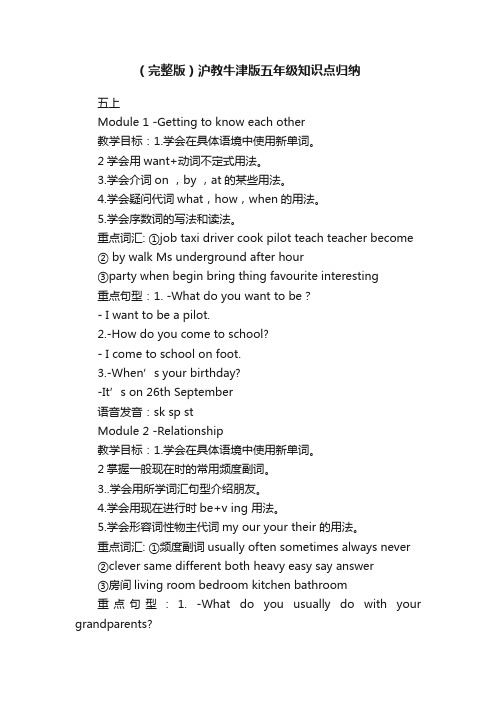
(完整版)沪教牛津版五年级知识点归纳五上Module 1 -Getting to know each other教学目标:1.学会在具体语境中使用新单词。
2学会用want+动词不定式用法。
3.学会介词on ,by ,at的某些用法。
4.学会疑问代词what,how,when的用法。
5.学会序数词的写法和读法。
重点词汇: ①job taxi driver cook pilot teach teacher become② by walk Ms underground after hour③party when begin bring thing favourite interesting重点句型:1. -What do you want to be?- I want to be a pilot.2.-How do you come to school?- I come to school on foot.3.-When’s your birth day?-It’s on 26th September语音发音:sk sp stModule 2 -Relationship教学目标:1.学会在具体语境中使用新单词。
2掌握一般现在时的常用频度副词。
3..学会用所学词汇句型介绍朋友。
4.学会用现在进行时be+v ing 用法。
5.学会形容词性物主代词my our your their 的用法。
重点词汇: ①频度副词usually often sometimes always never②clever same different both heavy easy say answer③房间living room bedroom kitchen bathroom重点句型:1. -What do you usually do with your grandparents?- I usually play chess with my grandparents.2.Kitty likes... Alice likes... we both like...3. -Where are you?- I'm in the bathroom. I’m doing my homework.语音发音:sh dr pr br crModule 3 -Out and about教学目标:1.学会在具体语境中使用新单词。
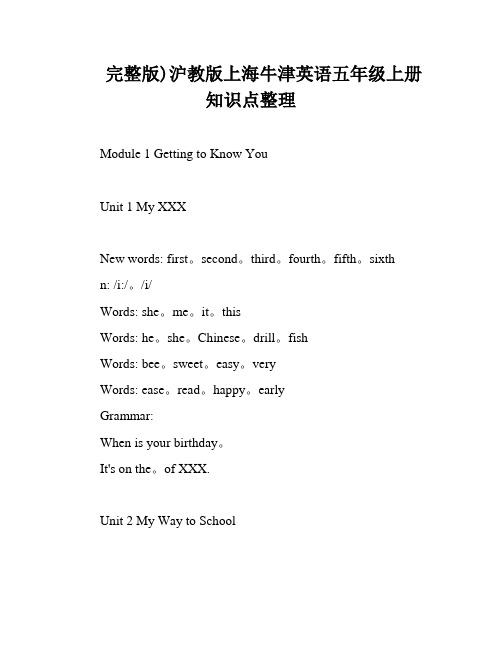
完整版)沪教版上海牛津英语五年级上册知识点整理Module 1 Getting to Know YouUnit 1 My XXXNew words: first。
second。
third。
fourth。
fifth。
sixth n: /i:/。
/i/Words: she。
me。
it。
thisWords: he。
she。
Chinese。
drill。
fishWords: bee。
sweet。
easy。
veryWords: ease。
read。
happy。
earlyGrammar:When is your birthday。
It's on the。
of XXX.Unit 2 My Way to SchoolNew words: taxi。
underground。
zebra crossing。
XXX。
pavementXXX: /e/。
/æ/Words: bed。
pet。
add。
dad。
backWords: any。
many。
apple。
blackWords: head。
breadGrammar:How do you come to school?I come to school。
Unit 3 My FutureNew words: worker。
pilot。
farmer。
cook。
shop assistant n: /p/。
/t/。
/k/。
/g/Words: pick。
map。
taste。
fruitWords: book。
job。
date。
badGrammar:What do you want to be?I want to be a/an。
Module 2 Me。
My Family and FriendsUnit 1 GrandparentsNew words: write an e-mail。
go shopping。
play chessXXX: /a/。
/ar/。
/a:/Words: class。

五年级上册英语知识点汇总:时间的读法:1.直接读法:小时分钟2.整点读法:小时o’clock3.半点读法:half past小时4.半点以内读法:分钟past小时·5.超过半点读法:差几分to下个小时6.含一刻钟读法:a quarter past小时(几点15分)a quarter to下个小时(几点45分)在几点(几分)用介词at相关词汇:基数词o’clock half quarter past to日期的表示:1.月份:January February March April May June July August SeptemberOctober November December对应的缩写:Jan.Feb.Mar.Apr.May.Jun.Jul.Aug.Sep.Oct.Nov.Dec.在几月用介词in,在几月几日,某天(的早中晚)用介词on2.日期:序数词:1~10:first second third fourth fifth sixth seventheighth ninth tenth11~20:eleventh twelfth thirteenth fourteenthfifteenth sixteenth seventeenth eighteenthnineteenth twentieth整十的序数词:变y为ie+th几十几的序数词:几十用基数词-个位用序数词例:21→twenty-first对应的缩写:1st2nd3rd其余的直接数字+th3.几月几日的表示:the日期of月份例:12月28日→the twenty-eighth of December月份日期例:12月28日→December twenty-eighth4.疑问代词When和What time的区别:When What time 询问做某事的时间√√(具体时间)询问年份,月份,日期√√询问现在几点(钟表时间)××乘坐交通工具的两种表达方式:take:take用作动词,表示乘、坐某一交通工具,且在表示该交通工具的名词前一般应有冠词等修饰词。